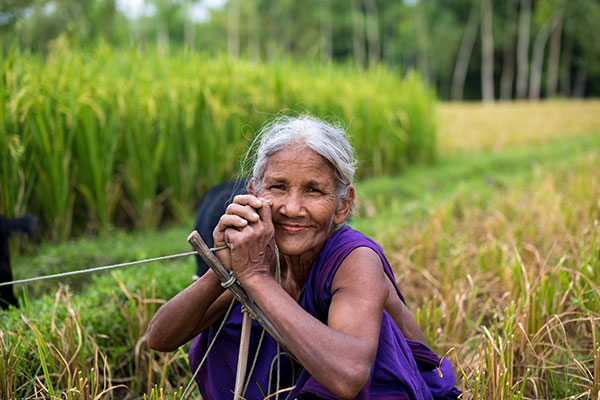Women are by far and away the biggest victims of climate change in developing countries, but there is growing support for the idea that they could also be central to the solution.
Over three quarters (80 per cent) of those displaced by climate change are women, according to the United Nations (UN).
As a result, gender equality is crucial to tackling the environmental crisis believes Mary Robinson, who is the former President of Ireland and one of the world’s most influential climate change and social justice activists.
“Climate change is a manmade problem with a feminist solution,” says Robinson, whose podcast, Mothers of Invention, showcases individuals challenging the norm, from human rights lawyers to plastic pollution campaigners. “Women and people from the global south really do suffer most and first from the adverse effects of climate change,” says Robinson.

Gender equality is one of the UN’s 17 sustainable development goals, addressing the fact that women are more likely to be uneducated, experience higher poverty and be less likely to be involved in the decision-making processes (both political and on a household level) that could influence their lives.
In developing countries, women tend to perform more environmentally-dependent work, such as collecting water and firewood, or tending crops. Although women make up 40 per cent of the agricultural labour force in the developing world, they only own between 10-20 per cent of the land.
And these inequalities are no longer going unnoticed. The UN’s Gender Action Plan is a roadmap to strengthening women’s role and representation within climate policy and ensuring gender is considered within any climate programme.
But change is also happening at a smaller level as women take things into their own hands.
Five years ago, environmental campaigner Natalie Fee founded Bristol-based City to Sea, a non-profit that campaigns to reduce plastic pollution. In her book, How to Save the World for Free, Fee writes that empowering women through education (and therefore improved career opportunities and better access to family planning), can help address global overpopulation. “Studies in developing countries have shown that having a secondary-school education is one of the single most important factors in choosing to have fewer babies in later life,” she says.
“We need to be aware of perpetuating the colonial mindset that ‘we’ in the global north need to empower women in the global south when actually even though they might have more children, they emit significantly less when it comes to greenhouse gases,” she continues.
“Really, we need to address our rampant use of fossil fuels and curb our out of control consumerism in the west. And here in the UK, we need our government to stop subsidising fossil fuels and instead switch those tax breaks to renewables and energy efficiency.”

For Faye Wilson, founder of ethical eco-beauty brand Happier Beauty, it’s about paying people fairly. “By ensuring that a business pays its workers a fair, decent wage and provides good working conditions, the women – who often work in the lowest paid jobs in a supply chain – and their families benefit,” she explains.
A recent study by the University of Manchester shows that inflexible working hours and excessive overtime for women workers in overseas supply chains have a major impact on their health and wellbeing of their families. “These women are less likely to have permanent contracts, and as such, are excluded from benefits such as maternity leave, childcare or sick pay,” says Wilson.
“Changing this status quo will help to reduce labour abuse and sexual harassment, plus give women workers a more stable income to better support their family.”
She also believes balancing profit and purpose can help create a fairer business, including gender equality. “Economies do not have to be based on a ‘winner-takes-all’ type of capitalism. Businesses have a duty to reward their employees fairly and employee-owned partnerships are a great example,” she says.

For some, true sustainability only really comes after social justice across the board. The new book by Swedish activist Greta Thunberg and her family, Our House is on Fire: scenes of a family and a planet in crisis, concludes that a step change is only possible after social transformation.
Greta’s mother, Malena Ernman writes: “Is the struggle for the environment the world’s greatest feminist movement? Not because it in any way excludes men, but because it challenges the structures and values that created the crisis we now find ourselves in.”
Australian science writer and author of Surviving the 21st Century, Julian Cribb radically argues that human survival depends on female leadership: “Put women in charge of business, politics, government, religion and society for the sake of human civilisation and its survival in the century of its greatest peril.”
According to Cribb: “Women think about their grandchildren, have a more conservative approach and consider long-term impacts – we need wiser leadership. Many women are already leading in the urban renewable food revolution and the regenerative agroecological methods that can restore landscapes.”
He adds that “men just like to fix things with weapons, chemicals, we ignore the consequences. It would be a much less devastated, dangerous and depleted world if women ran the planet.”
Sunday 8 March 2020 is International Women’s Day.









0 Comments